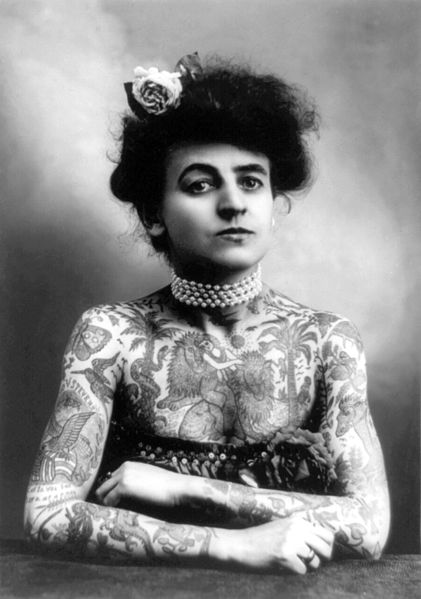Ask Anna: Tattoos

Why do we tattoo our bodies and what is their significance?
Tattoos, since they’re so symbolic and permanent, have always been used to mark something – usually, some sort of difference. Today we associate them with everything from alternative subcultures to general rebellion, and in fact, tattoos have had pretty “edgy” roots, for the most part.
 Way back in the Chinese Zhou Dynasty, convicted prisoners had tattoos signifying their identity on their face. Funnily enough, that tradition has infamously continued through the present day. Gang members and criminals use symbols like the kill teardrop to indicate affiliations and ties, the lengths of their prison sentences, and even the number of murders they’ve been involved with by inking them into their skin.
Way back in the Chinese Zhou Dynasty, convicted prisoners had tattoos signifying their identity on their face. Funnily enough, that tradition has infamously continued through the present day. Gang members and criminals use symbols like the kill teardrop to indicate affiliations and ties, the lengths of their prison sentences, and even the number of murders they’ve been involved with by inking them into their skin.
Ironically, the US military has a similar history of tattoo practices. The armed forces have a reputation of using ink to indicate their units, battles they’ve been through, and other indelible meanings.
Perhaps the similarity between criminals and soldiers in their tattoo practices highlights something else about why people choose to permanently alter their skin: Often, tattoos are a mark that bring people together. Whether it’s an ancient Southeast Asian tribal tattoo or a pop cultural reference, ink often alludes to bonds or meaning that are deep enough to be emotionally permanent.
Of course, just because interconnected groups of people understand the meanings behind their body modifications doesn’t mean that mainstream culture is always on the whole accepting of this difference. In the 1770s, when English ships arrived in Polynesia (the birthplace of tattoos), some tattooed Polynesians were brought back and put into circus shows. Even through 1907, tattooed women performed and were literally billed as “freaks.” The sailors themselves returned from their worldly travels with flat, cartoonish “old school” tattoos in specific motifs. That’s part of the reason why, even today, we associate pinup girls, swallows, and anchors on someone’s skin with sealegged Popeye types.
Tattoos haven’t even always been legal everywhere. Because of the Japanese crime group, the Yakuza, tattoos were outlawed in Japan. The Yakuza are highly structured, hierarchical, and ritualistic, performing many body modifications as rites of passage – thus, they became highly associated with intensive tattooing, and tattoos in Japan were associated with them. Apparently, one member threatened a child by lifting his sleeve and revealing one of his full-body tattoos, done the old-fashioned way – by poking holes and inserting ink directly under the skin. Getting tattoos, revealing them, or performing them on underage children remained illegal in Japan through World War II (the latter still is.)

Tattoos can be outlawed by religion as well. Abrahamic religions generally consider tattoos to be a desecration of God’s creation – that is, your body. Famously, some Jewish burial grounds forbid tattoos, though nothing in Judaism specifically proclaims this – it’s just considered a major violation of Jewish law and an affront to God. Similarly, different scholars of Islam disagree as to whether the religion explicitly forbids tattoos, or merely discourages and looks down upon them. The Catholic Church only goes so far as to forbid “blasphemous” tattoos, but the majority of Christians approve of religious tattoos, like crosses or images of Christ.
 Not all religions look upon tattoos unfavorably, however. Lirbai Mataji is a goddess followed by certain Hindu groups who imitate her characteristic tattoos. Many other Hindus support tattooing religious symbology for spiritual well-being – such as the Aum sign, the swastika depicted on many god’s hands, anything in the third eye area, and small dots on the face to repel evil and other negative influences. In certain parts of India, tattoos are solely preferred on the arms, hands, and face, since many gods have markings there – so it’s considered good luck. Not all Hindu tattoos are permanent, however – henna and mehndi designs are far more common in South Asia. You may have seen brides wear them on their hands during their wedding – again, to harbor good luck and ensure a happy marriage.
Not all religions look upon tattoos unfavorably, however. Lirbai Mataji is a goddess followed by certain Hindu groups who imitate her characteristic tattoos. Many other Hindus support tattooing religious symbology for spiritual well-being – such as the Aum sign, the swastika depicted on many god’s hands, anything in the third eye area, and small dots on the face to repel evil and other negative influences. In certain parts of India, tattoos are solely preferred on the arms, hands, and face, since many gods have markings there – so it’s considered good luck. Not all Hindu tattoos are permanent, however – henna and mehndi designs are far more common in South Asia. You may have seen brides wear them on their hands during their wedding – again, to harbor good luck and ensure a happy marriage.
 Mattel received some controversy upon releasing the tattooed, pink-haired Tokidoki Barbie. However, the doll was marketed as a designer collectible to adult collectors, and the media frenzy died down a bit. It’s interesting that tattoos are considered inappropriate for children to even look at. It says something about our culture’s understanding of deviance that we fear children are too impressionable to observe adults making decisions about their own self-expression. What message is a tattooed adult sending and why is it so dangerous and threatening? Shielding the gaze of youth from such body modifications indicates that “respectable” people don’t engage in such “fringe” cultural practices.
Mattel received some controversy upon releasing the tattooed, pink-haired Tokidoki Barbie. However, the doll was marketed as a designer collectible to adult collectors, and the media frenzy died down a bit. It’s interesting that tattoos are considered inappropriate for children to even look at. It says something about our culture’s understanding of deviance that we fear children are too impressionable to observe adults making decisions about their own self-expression. What message is a tattooed adult sending and why is it so dangerous and threatening? Shielding the gaze of youth from such body modifications indicates that “respectable” people don’t engage in such “fringe” cultural practices.
However, parents’ feelings about a tattooed Barbie might change in the future, because tattoos are still becoming ever more common and mainstream. What was once a symbol of counterculture has been embraced by more and more groups and individuals, for a variety of reasons. Just like other visual elements that make up a person’s self-expression, what we choose to put on our bodies says a lot about the cultures and subcultures we come from and choose to participate in. As our culture evolves, perhaps we’ll see tattoos become less and less taboo. For now, we recommend refraining from getting “Shhh…” tattooed on your pointer finger, unless you’re Rihanna.
Tell us about your tattoo and its significance to you.


